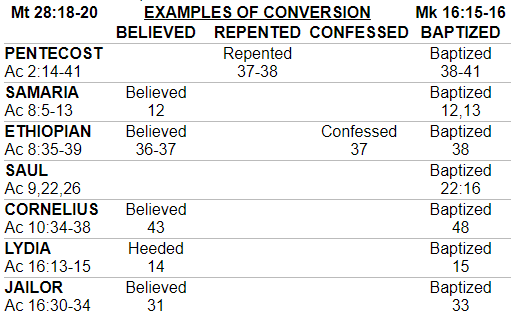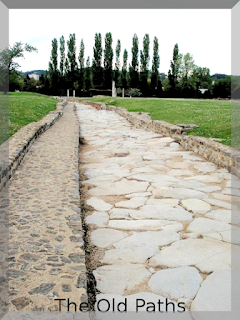https://executableoutlines.com/topical_series/baptism/ba_01.html
"BAPTISM"
Baptism In The Preaching Of The Apostles
INTRODUCTION
- Shortly before He ascended into heaven, Jesus gave His apostles The
Great Commission:
And Jesus came and spoke to them, saying, "All authority has been given to Me in heaven and on earth. Go therefore and make disciples of all the nations, baptizing them in the name of the Father and of the Son and of the Holy Spirit, teaching them to observe all things that I have commanded you; and lo, I am with you always, even to the end of the age." Amen. (Mt 28:18-20)
- In the gospel of Mark, The Great Commission is worded in this way:
And He said to them, "Go into all the world and preach the gospel to every creature. He who believes and is baptized will be saved; but he who does not believe will be condemned." (Mk 16:15-16)
- In both places we notice the mention of baptism...
- In Matthew, it is related to the process of making disciples
- In Mark, it is mentioned in connection with salvation
- But one might ask...
- What is baptism?
- Is it pouring, sprinkling, or immersion?
- Is one baptized in water, or in the Spirit?
- What is the purpose of baptism?
- Is it for the remission of sins, or because our sins have already been forgiven?
- Is it to be saved, or a public confession of faith having already been saved?
- Who should be baptized?
- Should infants be baptized?
- Should just anyone be baptized?
- Is there ever a need to be "re-baptized"?
- What if I was baptized as an infant?
- What if I was baptized for the wrong reason?
- What if I have sinned greatly after being baptized?
- This series is devoted to answering these and other questions related to baptism...
- Since it was commanded by Christ, it is certainly worthy of careful consideration
- It is my intention to glean from the Bible what is actually taught on this subject
- It is my prayer that you will have the attitude of those in Berea - cf. Ac 17:11
- To receive the word with all readiness (i.e., listen carefully with a desire to at least understand, if at first you do not agree)
- To search the Scriptures (i.e., to read the Bible carefully to see if what I am saying is true)
[In this lesson, we will simply consider how the apostles carried out The Commission Jesus gave them; i.e., to see what they said about baptism in their preaching. We begin with...]
- BAPTISM IN THE PREACHING OF PETER
- ON THE DAY OF PENTECOST...
- In the first gospel sermon, Peter commanded people to be baptized "for the remission of sins" - Ac 2:38
- Upon exhorting his audience to be saved, the response was for many to be baptized - Ac 2:41-41
- Does "for" mean "in order to" or "because of"?
- Note: We find the same grammatical construction in Mt 26:28
- Where Jesus said His blood would be shed for many "for the remission sins"
- Clearly Jesus meant "in order to" provide remission of sins, and not "because" remission of sins had already occurred
- With rare exception, the Greek word (eis) means "into, to, unto, for, toward"
- Note also: "be baptized" is joined by the conjunction "and" to the command "repent" - Ac 2:38
- Both are commanded "for the remission of sins"
- Just as people were commanded to repent "for" (in order to) the remission of sins...
- ...so they were commanded to be baptized "for" (in order to) the remission of sins
- AT THE HOUSE OF CORNELIUS...
- In the first gospel sermon to the Gentiles, Peter followed up by commanding his audience to be baptized - cf. Ac 10:44-48
- It is evident that what Peter commanded involved a baptism in water - Ac 10:47-48
- A future study will examine whether the people were saved when the Spirit fell upon them, or when they were baptized as commanded by Peter
- BAPTISM IN THE PREACHING OF PHILIP
- TO THE SAMARITANS...
- Though not an apostle, Philip went to Samaria and "preached Christ" - Ac 8:5
- The response to such preaching: "...when they believed Philip as he preached the things concerning the kingdom of God and the name of Jesus Christ, both men and women were baptized." - Ac 8:12
- TO THE ETHIOPIAN EUNUCH...
- To this very religious man, Philip "preached Jesus" - Ac 8:35
- Though we are not told the content of Philip's sermon, from the eunuch's question we can deduce that it included baptism - Ac 8:36-38
- BAPTISM IN THE PREACHING OF PAUL
- IN THE CONVERSION OF LYDIA...
- We note that again baptism followed apostolic preaching - Ac 16:13-15
- As evidence that she "gave heed" to the things spoken by Paul, she and her household were baptized!
- Notice also her comment in Ac 16:15
- How could Paul have judged her to be faithful to the Lord?
- By her response to the command of the Lord concerning baptism!
- IN THE CONVERSION OF THE PHILIPPIAN JAILOR...
- Paul tells the jailor that he must believe on the Lord to be saved - Ac 16:30-31
- Paul went on to speak concerning the Word of the Lord to him and his family - Ac 16:32
- In response, they were immediately baptized! - Ac 16:33-34
- Evidently the word of the Lord stressed the need to be baptized quickly
- In fact, in EVERY detailed example of conversion found in the Book of Acts, people were baptized after only one lesson! (see chart below)
- IN THE CONVERSION OF PAUL HIMSELF...
- Paul recounts his own conversion to the Lord - Ac 22:10-16
- He describes how he was told to go to Damascus, for there he would be told "all things appointed for you to do" ("what you must do" - cf. Ac 9:6)
- One of the things he was told was to be baptized without delay - Ac 22:16
- He was told to baptized in order to "wash away your sins"
- NOTE WELL: Despite seeing the Lord on the road to Damascus, having spent three days fasting and praying (Ac 9:9-11), he was STILL IN HIS SINS!
- Seeing the Lord had not saved him
- Accepting Jesus as Lord (cf. Ac 22:10) had not saved him
- Praying and fasting for three days had not saved him
- Not until he was baptized were his sins "washed away"! (exactly how we will examine later)
[At the very least, we can say that Peter's preaching was in harmony
with the statements of Jesus in the Great Commission: Preach the
gospel, command people to be baptized.
So far the indication appears that it was a baptism in water, and done
for the remission of sins. Let's consider now one who was not actually
an apostle, but certainly filled with the Spirit...]
[Like Peter, Philip "preached Jesus" not only by telling people about Jesus, but also what Jesus commanded. Baptism was an immediate result of such preaching. Is this surprising in light of Jesus' statements in Mt 28:19 and Mk 16:15-16? Let's now consider...]
CONCLUSION
- That baptism played a prominent role in apostolic preaching becomes
evident when we compare what is revealed in the examples of
conversion...

- In every case of conversion described in detail in the book of Acts, baptism is mentioned...
- Clearly it is was an important theme of apostolic preaching
- G. R. Beasley-Murray, a Baptist scholar, has observed:
"Baptism is...a part of the proclamation of Christ. In an Apostolic sermon it comes as its logical conclusion."
- G.R. Beasley-Murray, Baptism In The New Testament, Grand Rapids: Wm. B. Eerdmans Publishing Co., 1962, p. 393)
- And what should be proclaimed regarding baptism? In this lesson we have seen...
- That it was commanded "for the remission of sins" - Ac 2:38
- That it was done to "wash away sins" - Ac 22:16
- That it involved "water" - Ac 8:36-38; 10:48
- That it was done "immediately", with no delay even if after midnight - Ac 16:25-33
- This would certainly suggest that baptism is necessary for salvation...
- But is this a fair conclusion drawn from the "preaching" of the apostles?
- Is this conclusion consistent with the "teaching" of the apostles, as found in their epistles?
Our next lesson will examine what the apostles taught in their epistles regarding baptism, as we continue to seek Bible answers to such questions...







